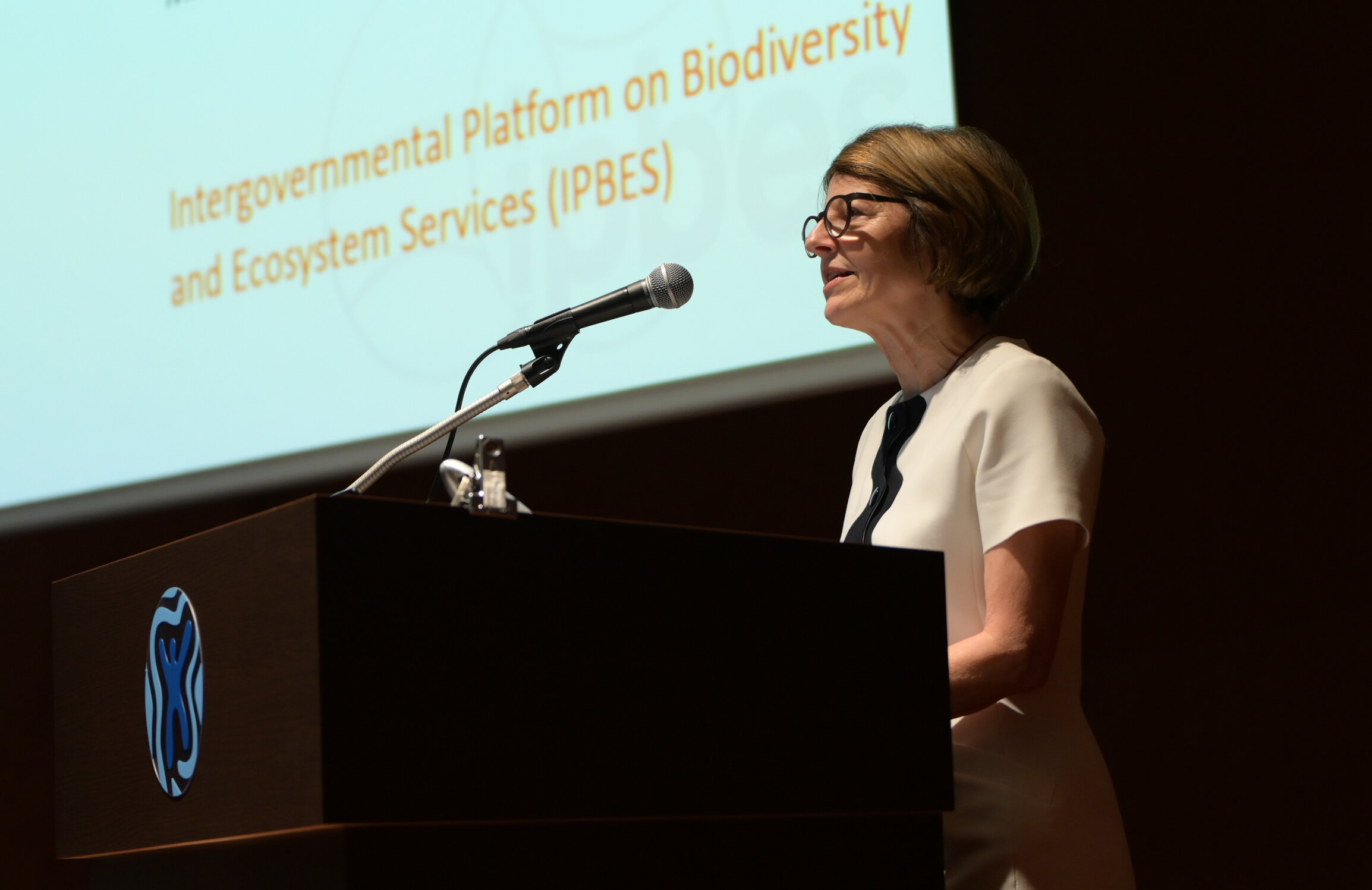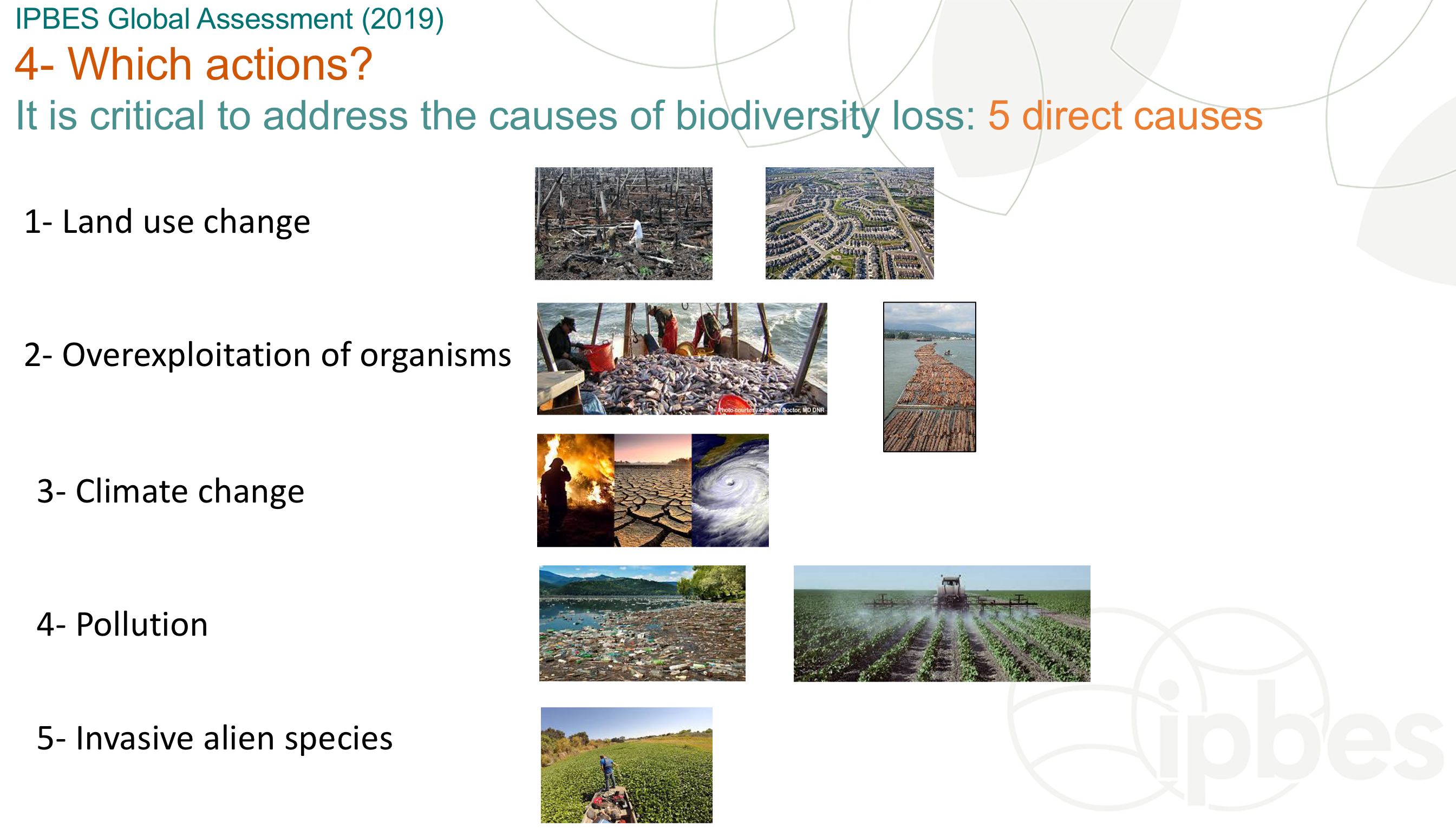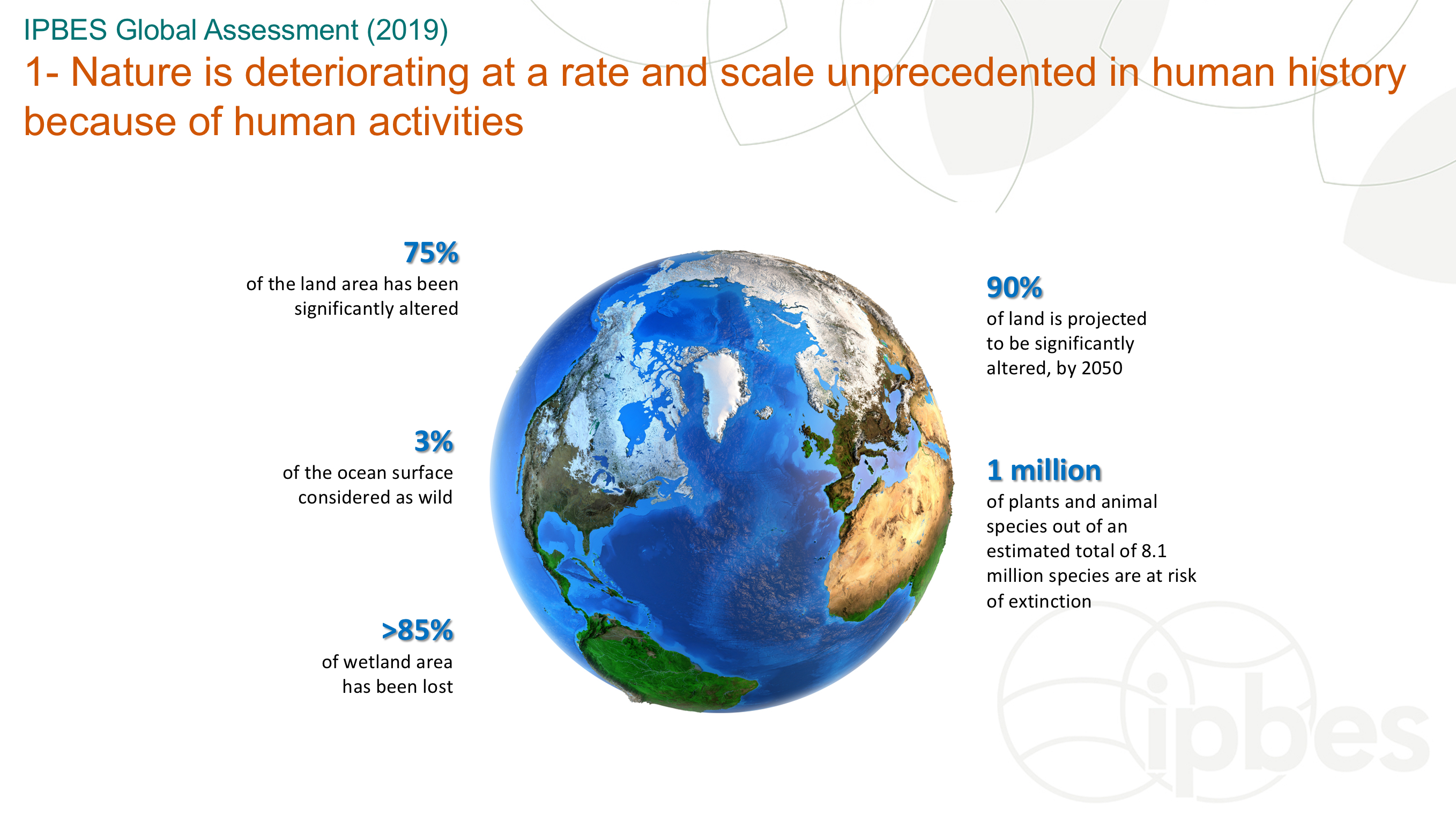af Magazine
~The Asahi Glass Foundation’s web magazine on the global environment~


A Decade of Biodiversity and What Lies Ahead: We Know What to Do. It's Time to Place Biodiversity at the Center of Policy and Economics and Stop the Loss.
The Intergovernmental Science-Policy Platform on Biodiversity and Ecosystem Services (IPBES), an independent intergovernmental body that assesses the state of knowledge about biodiversity and nature's contributions to people (NCP), is one of the 2024 Blue Planet Prize recipients. Since its establishment in 2012, IPBES has been scientifically evaluating the state of knowledge about biodiversity, raising awareness about biodiversity loss and conservation efforts globally, and providing a wealth of data to inform policy decisions and action. We spoke with IPBES Executive Secretary Dr. Anne Larigauderie about the importance of biodiversity and concrete actions to halt biodiversity loss. (Reconstructed from an interview in May 2024 and a commemorative lecture on October 24, 2024.)
IPBES: An intergovernmental body assessing biodiversity and nature's contributions to people (NCP), providing evidence to inform policy, decisions and action.

"Nature Positive," "Regenerative"--these terms are becoming increasingly common, and awareness of the importance of biodiversity is finally growing in Japan. However, the rate of species extinction continues to accelerate, and biodiversity loss is reaching a critical point, affecting our lives at the most fundamental level: such as the depletion of fishery resources and the decline of pollinators like bees, which are severely impacting food production.
The Intergovernmental Science-Policy Platform on Biodiversity and Ecosystem Services (IPBES) is one of the recipients of the 2024 Blue Planet Prize. IPBES assesses the best available science and evidence about biodiversity and nature's contributions to people (NCP), as well as providing evidence for policy decisions. It plays a role similar to that of the Intergovernmental Panel on Climate Change (IPCC), which addresses climate change issues. At the request of the Government that are members of IPBES (Japan has been a member since 2012), scientists collaborate across borders to compile scientific evidence on biodiversity from a range of knowledge systems, including Indigenous and local knowledge, assess the contributions of nature to people, and release numerous important assessment reports.
Dr. Anne Larigauderie, who has served as Executive Secretary since 2014, explained the organization's founding history this way, drawing a parallel between science-policy for climate change and for biodiversity: "The Earth Summit, held in 1992, led to the creation of the Framework Convention on Climate Change (UNFCCC) and the Convention on Biological Diversity (CBD). From its establishment, the UNFCCC was able to benefit from the scientific information on climate change provided by IPCC, itself established in 1988. The discussion on biodiversity loss was not as advanced, and it took 20 years after the Earth Summit, in 2012, for IPBES to be finally established." Dr. Larigauderie emphasized the organization's core philosophy, "Our role is to provide relevant, credible information, not to prescribe policies. We strive to be a reliable and authentic source for policymakers."
For example, like IPCC reports, IPBES assessment reports include a summary for policymakers. This summary is annotated to indicate the level of confidence experts have in each finding and response option, giving readers a clearer understanding of the state of knowledge and robustness of each key message.
Another key principle for IPBES is its interdisciplinary approach, and its reliance on multiple knowledge systems, including scientific knowledge and Indigenous and local knowledge.
Around one million species of plants and animals are at risk of extinction: the 2019 IPBES Global Assessment Report raised global awareness of the biodiversity crisis to unprecedented levels

Over the past decade, IPBES has produced 11 landmark assessment reports.
In 2016, IPBES scientifically demonstrated the significant decline of pollinators, such as bees, butterflies, birds and bats under the theme "Pollinators, Pollination and Food Production," revealing the substantial economic loss in food production and food security as a result. This report had a profound global impact and marked a turning point in raising awareness of the significance of IPBES.
The "Global Assessment Report on Biodiversity and Ecosystem Services" published by IPBES in 2019 was produced by nearly 500 scientists worldwide, the report drew on more than 15,000 references and was strengthened by 20,000 expert comments. Dr. Larigauderie highlighted that this Global Assessment yielded very significant findings.
"The report's first major finding was that nature is disappearing at an unprecedented rate and scale, driven by human activities. It revealed that 75% of the Earth's land surface has been significantly modified, and approximately one million plant and animal species out of an estimated 8.1 million species are threatened with extinction. This stark figure has become a global symbol of the biodiversity crisis, and it continues to be widely referenced in discussions about biodiversity loss."
The second conclusion is that the contributions of nature to people (NCP) are deteriorating worldwide. Out of the 18 categories of NCP, which include regulating, material and non-material contributions, 14 have declined over the past 50 years. Among these 14 contributions, 10 regulating contributions are related to important functions fulfilled by ecosystems on which humanity relies. These regulating contributions such as the capacity of ecosystems to pollinate crops, to low down climate change, to provide freshwater of sufficient quantity and quality, or to control the emergence of diseases, have deteriorated over the past 50 years.
Furthermore, the non-material contributions of nature, such as the capacity of nature to provide people with an identity or with physical and psychological experiences have similarly worsened. Non-material contributions, which are often difficult to measure, matter very much to people's quality of life, and when people lose their sense of place or the natural environment they belong to, they may feel as though they have lost a part of themselves and of their values.
Shift our values to embrace biodiversity and integrate biodiversity into all we do.

"It is essential to address the causes of biodiversity loss. IPBES has identified five direct causes: deforestation, overfishing in the oceans, climate change, pollution (pesticides, plastic, etc.), and invasive alien species. People need to change their actions and address these direct drivers of nature loss. It is time for people to reassess their values. Ultimately, it is individual values and behaviors that drive all actions and decisions," Dr. Larigauderie said. Along with this reflection on underlying drivers, she also mentioned concrete measures, stating: "The first step is to protect and maintain nature in areas that have not yet deteriorated."
This measure was included as a global target by 2030 in the "Kunming-Montreal Global Biodiversity Framework," adopted at COP15 of the Convention on Biological Diversity in December 2022. Known as the "30 by 2030 target," it aims to expand and manage protected areas on both land and sea. The Japanese government has also agreed to this Framework and has already begun efforts to designate 30% of land and sea areas as protected zones.
"In achieving this goal, it is essential to identify representative ecosystems that need protection, designate areas accordingly, and manage them effectively. It is also important for protected areas to be connected, through migration corridors, to allow species to migrate as a result of climate change. It is however not sufficient to protect 30% of terrestrial and marine areas; one must also pay attention to the remaining 70% of the Earth's surface as well. To do so, it will be necessary to place biodiversity at the center of economic activities" said Dr. Larigauderie.
Dr. Larigauderie also highlights the crucial role of agriculture in biodiversity conservation, which competes with natural ecosystems for land, and generates greenhouse gas emissions and pollution, like pesticides which harm biodiversity and people's health. IPBES showed that by adopting sustainable agricultural practices, people can start to restore terrestrial biodiversity. However, she notes that the lack of sufficient support for farmers to transform their practice is hindering this transition.
"Agricultural reform would be a shortcut to halting biodiversity loss with a sense of urgency because agriculture is related to the five direct causes of biodiversity degradation," Dr. Larigauderie argues.
"There is also something important that all consumers can do: adopt a healthier more sustainable diet. By choosing crops produced with consideration for ecosystems and reducing consumption of environmentally harmful animal proteins, we can reduce deforestation and overfishing, and contribute to biodiversity recovery."
We all have a part to play. Our food choices and our votes matter.

The 2019 IPBES Global Assessment Report generated more than 33,000 media articles in 55 languages worldwide, reaching over 160 countries within just one week of its release. Dr. Larigauderie summarized the past decade by stating, "IPBES has contributed to elevating biodiversity issues to the same level of urgency and priority as that of climate change. What's important is that this coverage has created allies. People have become aware of biodiversity loss, along with climate change, and young leaders, such as Greta Thunberg, have started to speak out against biodiversity loss in their own words."
Following the release of the Global Assessment Report, the IPBES findings were included for the first time by the World Economic Forum in its annual risk report on the top five most important risks to business. This prompted the business world to take greater action on biodiversity. Today, with many companies seeking guidance on biodiversity, IPBES is producing a report exploring how businesses can better protect, restore, and benefit from biodiversity. A business and biodiversity assessment report is scheduled for publication in 2025.
At the request of governments worldwide, IPBES is also set to update the Global Assessment Report in 2028-2029. This second Global Assessment Report will include an assessment of governments' progress towards achieving their 2030 targets.
In the meantime, only a few weeks from now, IPBES will publish two new assessment reports. The Nexus Assessment Report will address complex interlinkages and interactions among biodiversity, water, food, health and climate change. It will explore the costs of inaction, and it will offer a wide range of response options. The Transformative Change Assessment Report will highlight underlying causes of the biodiversity crisis and it will assess scenarios for achieving a more just and sustainable world.
"While IPBES has had a global impact, it is clear that countries are not acting fast enough. Therefore, we need to do more than just produce reports; we must engage more deeply with policymakers," said Dr. Larigauderie. "Scientific and governmental cultures are very different. But to translate our findings into policy and halt biodiversity loss more effectively, we need to build long and strong bridges between scientists and policymakers."
Lastly, Dr. Larigauderie offered two pieces of advice on what individuals can do to help biodiversity. First, choose more carefully what you eat. By selecting foods produced through sustainable agriculture and fisheries, and by reducing consumption of animal products that contribute to deforestation and overfishing, you can help protect species. Second, if you are a voter, choose politicians who value biodiversity.
Dr. Larigauderie concluded by saying, "Everyone has a role to play. Together with the younger generation, we must reverse these negative environmental trends. Biodiversity loss is a complex issue that requires the involvement of various scientific disciplines, including social and natural sciences. By connecting many fields of study, cultures, and societies, we can accelerate the process of solving this problem. I have high hopes for the future."
Profile
Intergovernmental Science-Policy Platform on Biodiversity and Ecosystem Services (IPBES)
One of the two 2024 Blue Planet Prize recipients
Established on April 21, 2012, the Intergovernmental Science-Policy Platform on Biodiversity and Ecosystem Services (IPBES) is an international intergovernmental organization that provides policymakers with information based on the world's knowledge of biodiversity and about nature's contributions to people (NCP). IPBES's groundbreaking assessments have become the foundation for evidence-based policy and action at various scales and across a range of knowledge systems. Headquartered in Bonn, Germany, IPBES has been led by Dr. Anne Larigauderie as Executive Secretary, since 2014.


